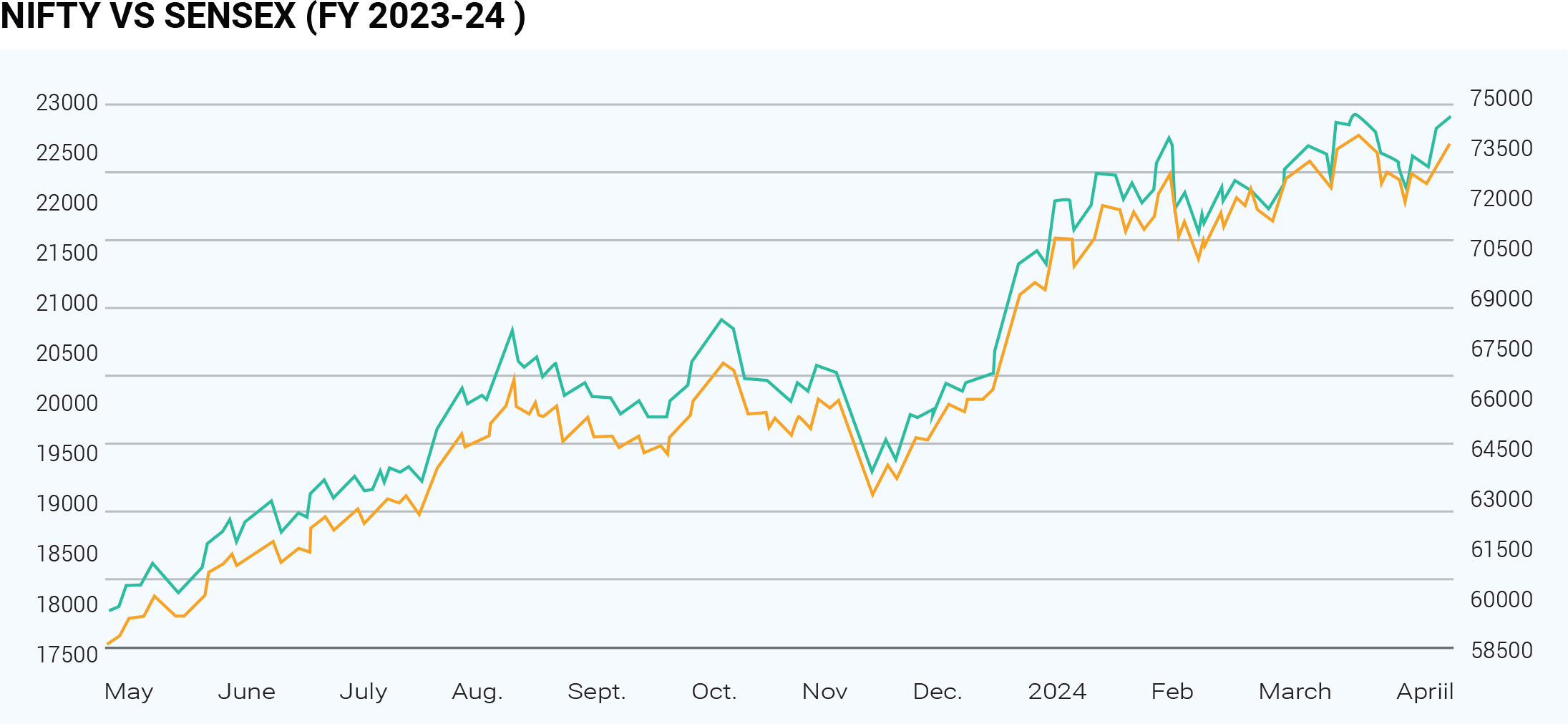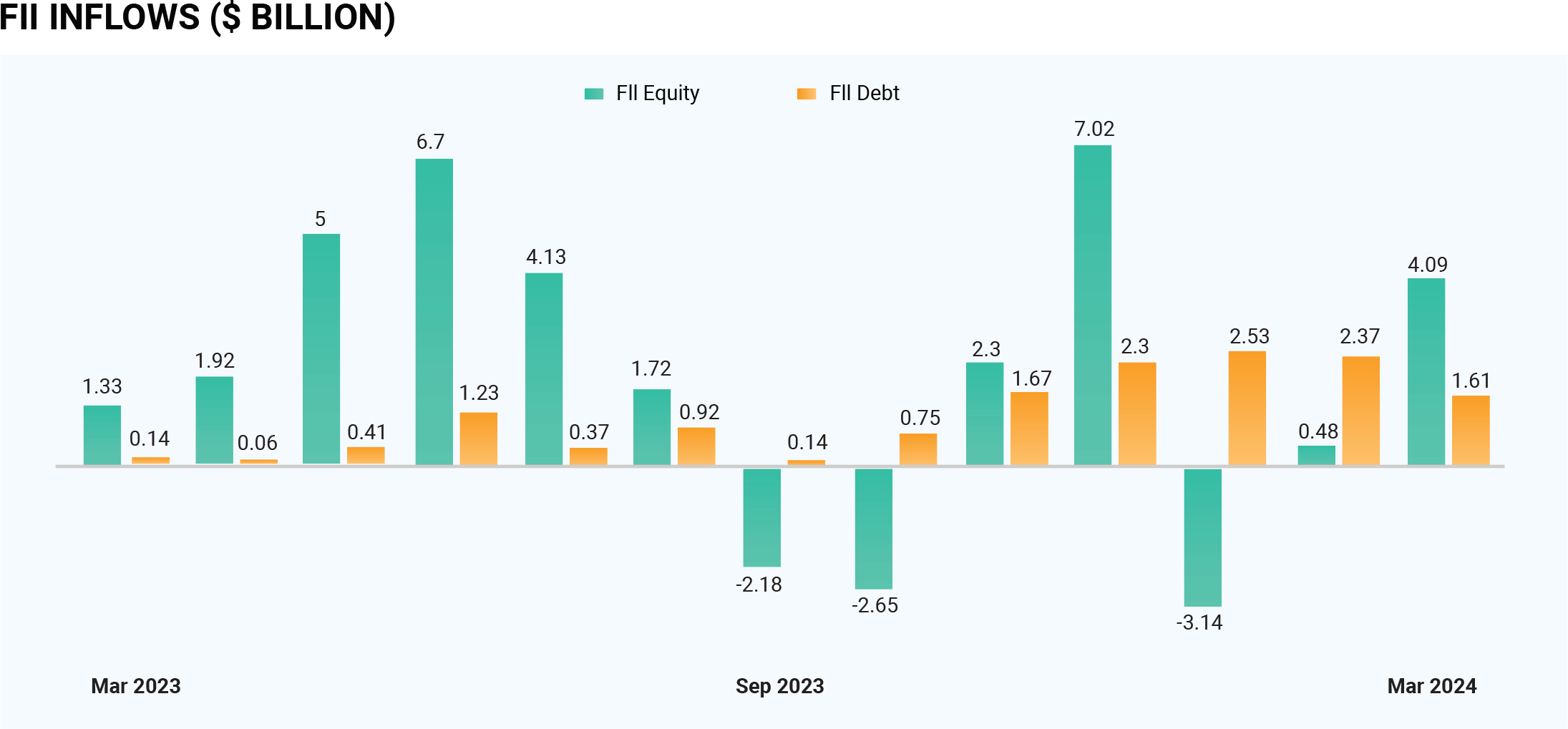The Indian stock market closed FY2023-24 on a
triumphant note, with the Sensex index surging over 655
points (1%) to reach a record-breaking closing level of
73,651.35. This impressive ending capped off a year
defined by consistent growth and a series of record highs
for both the Sensex and Nifty. FY2023-24 was a true
blockbuster year for the Indian market. Both benchmark
indices repeatedly shattered previous records,
highlighting robust market confidence. A significant
milestone was achieved in November 2023 when the
market capitalization of BSE-listed companies crossed a
staggering ₹333 lakh crore (approximately $4 trillion).
This growth builds upon the impressive gains witnessed
in FY2021, with the market continuing its upward
trajectory in FY2024 and registering an overall gain of
around 25%.
Several factors fuelled this stellar performance. Strong
economic fundamentals, characterized by healthy
economic growth and positive corporate earnings,
instilled confidence in investors throughout the year. This
positive sentiment was further bolstered by the fact that
9 out of 12 months ended in positive territory, signifying
a consistently bullish market. Beyond these core drivers,
FY2024 witnessed a surge in initial public offerings
(IPOs) and mega-mergers, reflecting increased investor
interest and market activity. The year was also marked by
swift and decisive regulatory responses from authorities,
which further strengthened investor trust in the market
system. This combination of robust economic
conditions, positive corporate performance, increased
investor activity, and a strong regulatory environment all
contributed to the Indian stock market's phenomenal
performance in FY2023-24. This year serves as a
testament to the resilience and potential of the Indian
market, paving the way for continued growth in the years
to come.
NIFTY breached all levels and continues to stride
touching new lifetime high of 22,525 on 7th March 2024.
The Nifty 50 index, reflecting the performance of top-tier
companies, has surged by 30% so far in FY24. Large-cap
companies have also demonstrated robust performance
in FY24, with several stocks delivering multibagger
returns. Large cap gave a return of 33%, mid cap
increased by 56% and small cap left everyone behind and
gave a spectacular return of 63% in FY24.The sectors
which have witnessed extraordinary gains are Realty,
Central Public Sector Enterprise (CPSE) and
infrastructure. The BSE Realty index, for instance,
experienced an astonishing surge of 130%, accompanied
by significant gains in Power (83%), Capital Goods (75%),
and Auto (72%). The realty sector performed
exceptionally well, followed by Cabonex at 114% and
CPSE at 100%. Public Sector Undertaking (PSU) stocks
have emerged as standout performers in FY24, offering
substantial returns to investors, with some stocks
witnessing up to five-fold increases in their value. In
FY24,IPO market flourished witnessing a surge in activity
with approximately 75 new issues launched. Many
companies delivered over 150% post listing. The average
listing gain saw a notable increase to 29%, highlighting
the investor enthusiasm for these new offerings.

Foreign Portfolio Investors (FPIs) have displayed renewed confidence in Indian equities, injecting more than Rs 2 lakh crore into the market in 2023-24, driven by optimism surrounding the country’s robust economic fundamentals amidst a challenging global environment. Foreign Portfolio Investors (FPIs) have made a net investment of around Rs 2.08 lakh crore in the Indian equity markets and Rs 1.2 lakh crore in the debt market. Collectively, they pumped Rs 3.4 lakh crore into the capital market, as per data available with the depositories. FPI debt flows have gathered momentum since November 2023 because of sentiment buying post announcement of India’s inclusion to JP Morgan Global Bond Index. Also, India’s buoyant growth story coupled with fiscal prudence, leveraged sentiments of foreign investors at a time when still some degree of uncertainty prevailed over the outlook of the global economy. India's 10-year yield is expected to continue its downward trend, potentially breaching 6.95% in the second half (H2) due to a confluence of factors. Favourable growth-inflation dynamics coupled with potential RBI rate cuts (25-50 bps from August) are expected to drive the decline. Expecting the foreign portfolio inflows (FPI) would provide support the markets.

Throughout 2023-2024, Gold prices in India remained
elevated due to rising geopolitical tensions around the
globe. The value of this precious metal also fluctuated
significantly, impacted by slowing economic growth in
developed countries and efforts by central banks
worldwide to curb inflation through stricter monetary
policies. Historically gold has earned a reputation as a
safe haven. When economic storms brew or geopolitical
tensions rise, investors often seek refuge in this precious
metal. Gold's appeal stems from its ability to hold its
value over time, acting as a shield against inflation and
the erosion of currencies. MCX gold price rallied more
than 12% in FY24, from around ₹59,400 per 10 grams at
the beginning of the year to around ₹67,000 per 10 grams
at the end. According to the World Gold Council (WGC),
gold demand in India is expected to rise to 800-900
tonnes in the calendar year 2024 on the back of robust
economic growth and higher income. This would usher
the gold prices in FY 2024-2025.
In FY24, the rupee plummeted by 1.5% against the US
dollar, compared to the previous fiscal year's 8% decline.
Despite surging oil prices and a strengthening dollar, the
rupee fared better compared to other emerging market
currencies. On the last day of FY24, the rupee closed at
83.40. While crude prices rallied as much as 19% from
their December lows, the dollar index gained 3.5% to 105
during the same period. India has been vulnerable to high
global oil prices as the country imports 87% of its oil
demand. High oil prices would widen India's current
account deficit (CAD) and put pressure on the currency.
Foreign flows of $40 billion to equity and debt markets
also backed the currency. Adding to this, Bloomberg
announced in March 2024 its decision to include India's
Fully Accessible Route (FAR) bonds in the Bloomberg
Emerging Market (EM) Local Currency Government Index
and related indices, phased in over 10 months, starting at
the end of January 2025. This would attract inflows of
around $25-30 billion over the next year.
The evolving global and domestic interest rate dynamics
could expose Indian markets to vulnerabilities. For India,
ensuring sustained economic growth and robust
corporate earnings will be crucial for maximizing returns.
Furthermore, ongoing geopolitical tensions worldwide
and China's economic resurgence will greatly impact the
future of Indian markets. Expect significant
transformations in the global economic and financial
landscape in the coming days.
The new financial year (2024-25) ushers in significant
changes affecting your personal finances. From taxes
and credit cards to insurance, and even FASTags, get
ready for adjustments starting April 1st, 2024. This
marks the implementation of the Union Budget
proposals, impacting various aspects of the financial
system. These few changes would provide more security
to the investors and easy accessibility. Understanding
these updates is crucial, as some will become essential
for managing your personal finances effectively.
E-Insurance & Surrender Charges
In a notification "Protection of Policyholders’ Interests,
Operations and Allied Matters of Insurers Regulations,
2024" dated March 20, 2024, the Insurance Regulatory
and Development Authority of India (IRDAI) said, "Every
insurer shall have in place a Board approved policy for
insurance policies issued in electronic form…” Under this
directive all the insurance policies like health, life and
general insurance will be issued electronically.
Surrender value in insurance is the sum disbursed by the
insurer to the policy holder when policy is terminated
prematurely. The Insurance Regulatory and Development
Authority of India (IRDAI) has announced the final set of
rules on surrender value. From April 1, 2024, the
surrender value is expected to remain the same or even
lower if policies are surrendered up to a period of within
three years. However, if policies are surrendered between
the fourth and seventh years, there can be a marginal
increase in surrender value.
New or Old Tax Regime
The New Tax Regime will be the default tax regime from
April 1. This implies that unless individuals explicitly
choose to abide by the old tax structure, taxes will be
automatically assessed and applied according to this
new system. The income tax slabs in the new tax regime
will remain unchanged for FY 2024-25 (AY 2025-26). No
changes have been announced in the interim budget.
With respect to these regulations under the renewed
scheme of things, any individual earning an income up to
Rs 7 lakh annually shall not bear liability for paying taxes.
The changes aim to simplify the process of tax planning
while providing relief to the taxpayers. The Centre will
implement the New Tax Regime as the default setting,
which implies that unless individuals manually choose to
abide by the old tax structure, taxes will be automatically
assessed and applied according to this new system.
New NPS Authentication
The process to log in at the website of the National
Pension System (NPS) and check accounts changed on
April 1. The Central Record Keeping Agency (CRA)
system of NPS has implemented an Aadhaar-based login
authentication mechanism that will be in addition to the
website requiring user ID and personal password. Login
would involve a two-factor Aadhaar-based
authentication, as per changes sought by the Pension
Fund Regulatory and Development Authority (PFRDA).
New Rule for FASTag
From 1st April, vehicle owner needs to update the KYC of
car’s FASTag with the bank. Now its mandatory to
complete KYC process for FASTag before March 31st to
avoid deactivation by banks. With KYC updation payment
are not possible and driver can land up paying double toll
tax charges. NHAI advises the FASTag users to comply
to the RBI rules for smooth transaction at toll plazas.
Credit/Debit Cards Costlier
As SBI announces removes reward points on rent
payment transactions from 1st April 2024, many other
banks also announced these changes in their credit card
perks. The next is credit card which also announced
changes for the easy access to the airport lounge
facilities and there are increase in the charges too.
Individuals need to check from their respective banks.
OLA Money wallet Switch
OLA Money announced that it is entirely switching to small
PPI (prepaid payment instrument) wallet services, with a
maximum wallet load restriction of Rs 10,000 per month
starting April 1, 2024. The company sent SMSs to its
customers informing them about this on March 22, 2024.
Mutual funds need KYC
From April 1, investors who have not re-done their KYC
(know your customer) will be not allowed to do any MF
transactions. These would include SIPs (systematic
investment plan), SWPs (systematic withdrawal plan)
and redemptions. Emails were sent by registrar and
transfer agents (RTAs), CAMS (Computer Age
Management Services) and KFin Technologies
(KFintech) to mutual fund distributors (MFD) that MF
investors should re-do their KYC (know your customer)
by March 31. The officially valid documents as
mentioned in these emails include Aadhaar card,
passport, voter ID card, among others. KYC done based
on proofs such as bank statements and utility bills will no
longer hold valid after this deadline.
By implementing these changes, we can achieve better
governance of the country's financial and economic
landscape. Investor awareness of these changes will
empower them to make informed decisions about their
financial limitations and opportunities for future
spending and investments.

Copyright © 2021 Fintso


